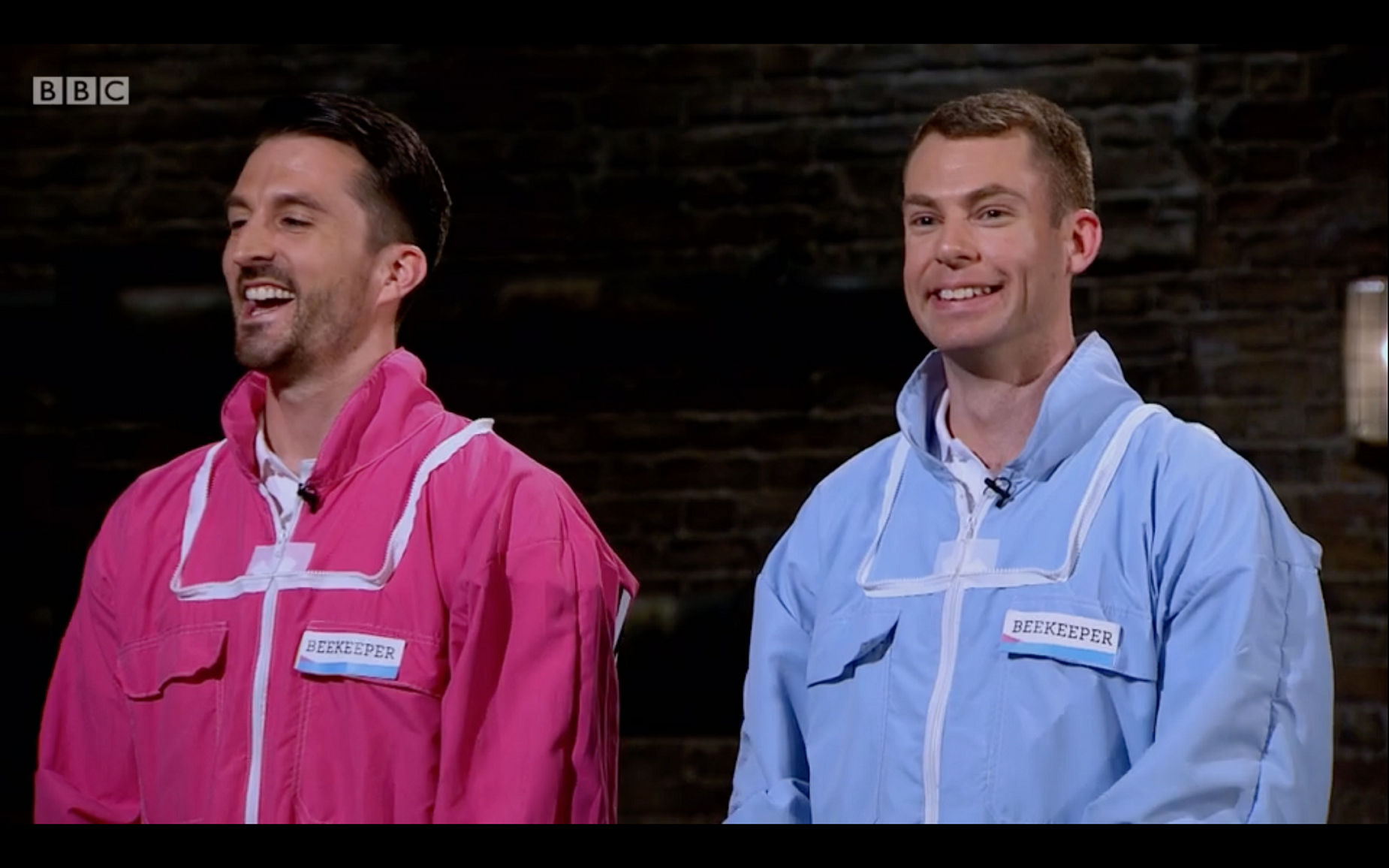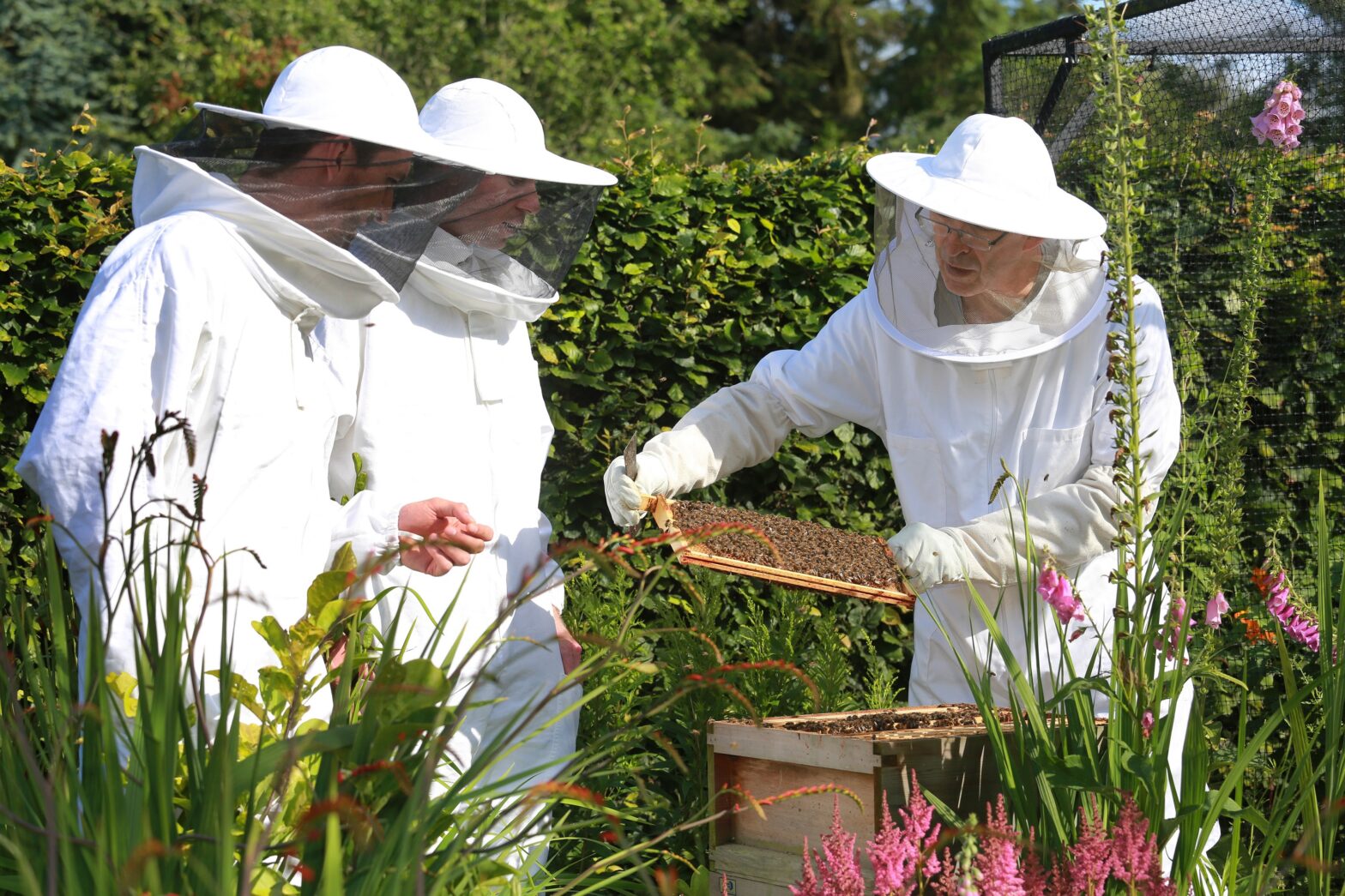It’s not easy saying no in general, let alone to one of the sharpest investors on Dragon’s Den. Joe Harper and Andy Sugden braved the den and came out on top, even after turning down a £65,000 offer from Peter Jones. Co-founder Andy Sugden tells GrowthBusiness how the honey water brand Just Bee got off the ground and to shelves across the country, from Selfridge’s to Boots.
Where did the idea for your business come from?
We’ve been friends for over ten years or so, and we were in a position where we wanted to start our own business but weren’t sure what to do. We came up with a few ideas at the pub over a pint. Some seemed like good ideas, but after a few days, not so much. It was a while after that when Joe came up with the idea of doing something with honey.
His dad manages a bee farm in Lancashire. It was originally his grandfather’s business. Growing up, Joe’s always used honey as a natural sweetener in cups of tea, porridge, and toast, but no one had thought of making drinks sweetened with honey. So we thought we’d bring something to market that is totally naturally, and doesn’t use sugar or artificial sweeteners. At the same time we were developing the idea, there was a lot of research out there on how bad sugar is for you.
How did you know there was a market for it?
When we thought of doing something with honey, we thought of hundreds of things, from selling jars of honey, developing cooking sauces, or even cosmetics. There are so many different things honey can be used for, but we thought drinks would be interesting, because there seems to be a growth in low sugar natural beverages, and it struck us as really strange that nobody had done it before.
We were careful about it though. We didn’t want to brand it as super healthy or a really expensive health drink. It’s just a great-tasting drink everyone can have, but with low sugar.
We did a lot of market research through friends and family. It was us making up samples of the drink over the weekend, taking them to work, passing them out to friends and getting feedback. We also spoke to a number of local of coffee shops and delis, as well as to health food stores in London like Whole Foods and As Nature Intended. We spoke to them on the phone about the idea, and the feedback was really positive. But they did say that ultimately it comes down to taste, and unless they’ve tried the products they can’t give any solid feedback. By March 2015, we reached a point where we had to make a decision. Either we would leave our jobs and go for it completely or we’d stop. We decided to take the plunge.
Because the idea has come from Joe and his family of beekeepers, we are very aware of the sustainability element. The global bee population is in decline and this isn’t good for food sustainability; not just for honey but all crops in general.
We want to raise awareness of the importance of bees and in keeping the bee population healthy. One thing we do is hand out free packets of wild flower seeds. The idea is people can get the seeds and plant them in the park or garden, and when they flower, they will attract bees.
10 per cent of all our profits are donated to Friends of the Honey Bee, a charity set up by the British Beekeepers Association.
In terms of honey supply, we are very careful which honey farmers we work with so its ethically produced. We use a blend of British and European honey, mainly Welsh bee farm, Hilltop Honey, and farms in Spain. Spain has better weather, so bees are a lot more active and produce a lot more honey.
We work with a network of bee farmers, so as we grow, so can our supply chain.
Why London?
To be honest, we spend half of our time in London. A lot of the big customers have their head offices in the South East. There’s also a lot of the marketing we do, whether it’s events or working with journalists and influencers. Most of them are based in London and the South East. The other thing is the population and foot fall in London. The volume of drinks that are sold in London is huge in comparison to the rest of the country. I’m sure I’ve heard that Tesco sells a third of their bottled water within the M25.
People are more on the go, as well. All of this makes London a key area for any drinks company.
What was your first big milestone and when did you cross it?
The first few months from when we launched in March, we were focussed on selling in Manchester. We just knocked on the doors of cafe and delis. The first break into London came in the summer when we were listed in Fortnum & Mason, and very quickly after that, Selfridge’s. That was huge break for us. Once you get those high profile stores, you can go other retailers easily. It was a massive step forward.
In 2016, we were listed in Boots, Waitrose and Holland & Barrett, another huge step.
The first 12 months helped us establish the brand by being in high profile stores, which was absolutely fantastic in building awareness of the brand and giving the brand credibility. 2016 was about making it more accessible to people.
How did you raise funding, and why?
The very first thing we got was a Government Innovation Voucher. This was when were still at our desk jobs and were discussing our recipes. The £5000 voucher helped us really go out there and develop our recipes. Joe and I put in our personal savings to get the business off the ground as well. We also received investment from an individual at the end of 2015. At that point, we had been trading for nine months and had proven the concept. What we needed then was to push the business forward.
Let’s talk about the dragon in the room. How was your experience on Dragon’s Den?
We’re both such huge fans of the show, we actually applied for it before we even launched, back in 2014. We had the concept and idea, and were developing the drink when we put the application in to the BBC. They asked us to go for an interview audition. We went, but we were obviously far, far too early. We then forget all about it, launched the drinks and got the Selfridge’s, and Fortnum & Mason listing. The BBC got in touch saying they’ve been tracking our progress, saw our listings and asked if we’d like to go for another audition. We made it on the show, which was filmed in May 2016. We spent weeks practicing the numbers in front of the mirror, going through every question we thought we could possibly be asked. Our investor helped us by grilling us with questions. We were nervous, of course, but it was amazing.

You famously turned down Peter Jones’ offer. Why was that?
If there’s one dragon we’d love to work with, it’s Peter Jones. He’s had fantastic investments in the food and drink industry that have really taken off. He was the one we were really hoping to get an offer from. We sat down the night before and talked about what we’d do if we got an offer, and what the highest percentage of the company we were willing to give up. We decided on up to 15 per cent.
When Peter came in with his offer of 25 per cent, it was really difficult. Half of me wanted to say ‘Absolutely! We’d love to get him on board and work with him’. It’s easy to say yes when you’re stood there in the den. But we had to say no.
After the show aired last weekend, some people have emailed in saying “What have you done! How could you turn down Peter Jones?!” But some have also said “Good on you for sticking to your guns.”
The way Joe and I look at it is, because it was filmed in May 2016, we were in discussions with Waitrose, Boots, and others, but none of those listings were confirmed. And even though we didn’t take Peter’s offer, we have been able to significantly grow from then. We still managed to grow the business and hold on to our equity. It’s only been a few days since the episode aired, but we’re already getting a lot more traffic to the website, as well as emails from consumers saying they’ve just tried the drinks and love them.
What advice would you give to other entrepreneurs?
Have a go at things. We meet a lot of entrepreneurs at food and drink events that have lots and lots of experience. Joe and I haven’t. We weren’t sure what would or wouldn’t work. A lot of times we had to accept that and give it a go anyway. Some things work amazingly and we’d do more of it, and some wouldn’t and we’d learn from them.
Where do you want to be in five years’ time?
We’d like to just continuing to grow the business. We’ve always set ourselves the goal to be household brand. It’s a big ambition and a tough challenge but that’s what we’ve always said to ourselves. More and more people are looking for healthier, lower sugar, natural alternatives to traditional sugary soft drinks. Just Bee is the perfect alternative for those. Our goal is to make the most of it and grow.
If you weren’t an entrepreneur, you would be…
…an entrepreneur. Once you set something up for yourself and work for yourself, it’s very difficult to think about going back to a desk job. I think I’d still be running a business but maybe in something different.







